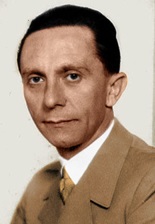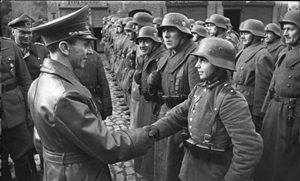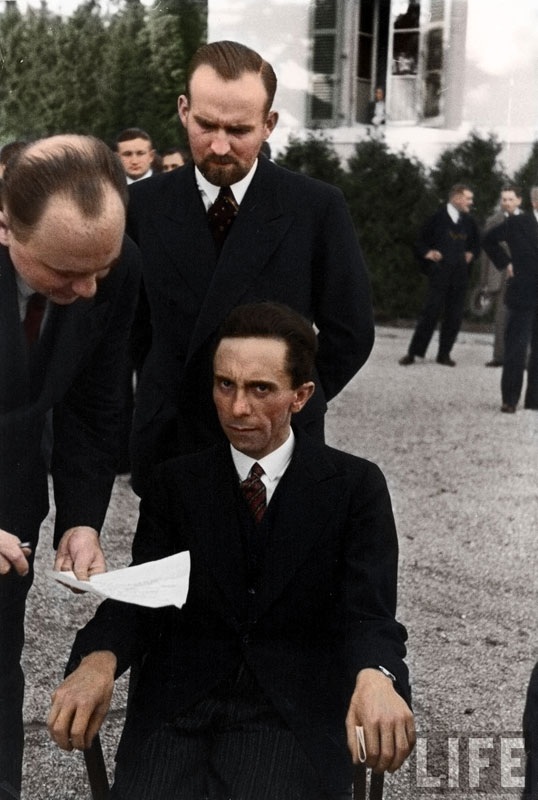
Joseph Goebbels Quotes
Quotes by and about Joseph Goebbels
(Continued from his main entry on the site.)
[Asked if he believed in the antisemitic forgery 'The Protocols of the Elders of Zion':]
Goebbels: "I believe in their inner truth, not in their factual authenticity."
[Recounting his day in a diary entry:]
Goebbels: "At table the Führer made another strong plea for vegetarianism. I consider his views correct. Meat-eating is a
perversion of our human nature. When we reach a higher level of civilization, we shall doubtlessly overcome it."
Goebbels: "Ribbentrop [speaks] without sufficient psychological skill."
Goebbels: "[Himmler's] behavior is very autocratic."
Goebbels: "Dr. Westrick has arrived back from the USA and delivered a report on the primitivity of the people, the crudeness of the political methods, and the cynicism of the Roosevelt-clique. He believes that Roosevelt will formally declare war. I still doubt it. In any event, that is not a country where I would like to be buried."
Goebbels: "I have noticed a slight element of cynicism creeping into our reporting of the war. ... I put a stop to this. ... Our style for this war must be hard, manly, unsentimental, sober, but without smart aleck cleverness. Sarcasm can only harm things."
Goebbels: "[I] tone down the grotesque exaggerations - 'London a sea of flames', etc. - which ... can only harm us in the future. We must not arouse hopes if they cannot be fulfilled immediately."
Albert Speer: "[My first impression of Goebbels' speech-making was] much phrase-making, careful structure, and incisive formulations; a roaring crowd whom Goebbels whipped up to wilder and wilder frenzies of enthusiasm and hatred; a witches' cauldron of excitement. ... I felt repelled."

Albert Speer: "Both Goebbels and Hitler had understood how to unleash mass instincts at their meetings, how to play on the passions that underlay the veneer of ordinary respectable life. Practiced demagogues, they succeeded in fusing the assembled [people] into a homogenous mob whose opinions they could mold as they pleased."
Joachim von Ribbentrop: "I admired Goebbels who was the most intelligent of the whole [Nazi] circle. He was a genial, but nevertheless diabolical person."
Toby Thacker: "[The] enduring characteristics of Goebbels' thought, speaking and writing [are]: An emotional, fervent style, at once seemingly open, revealing and appelatory; a bombastic use of language; a passionate nationalism, confused with religious sentiment; and an alarming lack of .... critical doubt."
Toby Thacker: "If we analyze ... the cinematic techniques developed by the Nazis to enhance their propaganda ... it is clear that responsibility for individual techniques and striking visual innovations lies more with collaborators like Leni Riefenstahl and Albert Speer than with Goebbels whose role was more of a facilitator."

Toby Thacker: "[Rather than] his formal studies] ... [Goebbels] appears to have been far more influenced by ... the views of his closest friends."
Toby Thacker: "[Goebbels] was creative and energetic [but] unfit for routine work."
Toby Thacker: "[Goebbels] inverted Marx. ... For Marx, economics affairs took primacy and determined the form of politics and of culture. Goebbels believed, conversely, that the 'idea' and the 'will' were formative, and that economics were secondary to them."
Toby Thacker: "[By 1943] Hitler moved into the isolation of his military headquarters, what Goebbels called 'this eternal bunker life', and gradually became more and more distant from the German people; this was paralleled ... by the retreat into private indulgence of Goering, and the death or disappearance of other senior Nazi figures, like Hess. Goebbels ... refused to move into a bunker ... and actually increased his contact with the ordinary public, particularly when the British and American bombing of Germany intensified in 1943. At the most difficult moments ... and in cities which had just suffered an ordeal by fire Goebbels was ready to face the German people and to exhort them to continue an increasingly uneven struggle."
Alfred Krebs: "[Goebbels] spoke with enthusiasm about cultural and artistic matters [and] skirted around political matters."

John Keegan: "Like Hitler, he was also a passionate devotee of the cinema, but, while the Führer used the medium chiefly as a means of personal relaxation, Goebbels understood and seized on its power to sway the national imagination."
John Keegan: "Hitler ... lacked the [inclination] for anything more than the occasional sensational display of emotion, in particular the great set-piece speech which mesmerized the mob and left him drained of nervous energy. Goebbels, on the other hand, though a galvanic speaker in his own right, directed his overflowing energy into the day-by-day and minute-by-minute [communication]."
John Keegan: "Goebbels' [method] was anti-rational and emotive in every regard."
John Keegan: "Like Hitler, Goebbels believed in the primacy of the spoken word over the written word as an instrument of thought control."
Victor Klemperer: "[Goebbels' speeches had a] pastoral unctuousness and heartfelt tone of delivery."

